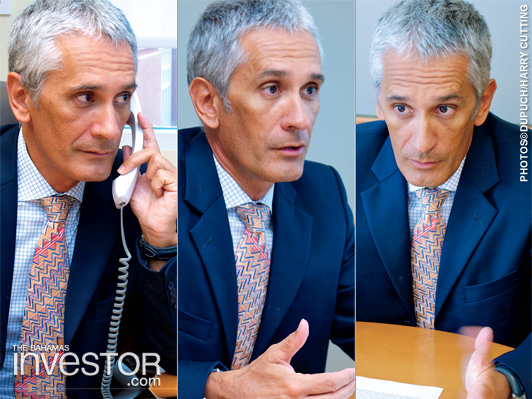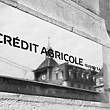| Published: Date: Updated: Author: |
The Bahamas Investor Magazine January 15, 2013 January 15, 2013 Catherine Morris |
 Credit Agricole Suisse has been at the forefront of private banking in The Bahamas for the last ten years, offering investors an array of services tailored to meet their individual needs. The Swiss bank prides itself on developing long-term relationships with its clients and its wholly owned Bahamian subsidiary is no different. In an exclusive interview with The Bahamas Investor, chief executive officer of Credit Agricole Suisse (Bahamas) Ltd, Antoine Candiotti, gives his insights into the sector and explains why the bank is well placed to continue delivering quality services against the shifting financial landscape.
Credit Agricole Suisse has been at the forefront of private banking in The Bahamas for the last ten years, offering investors an array of services tailored to meet their individual needs. The Swiss bank prides itself on developing long-term relationships with its clients and its wholly owned Bahamian subsidiary is no different. In an exclusive interview with The Bahamas Investor, chief executive officer of Credit Agricole Suisse (Bahamas) Ltd, Antoine Candiotti, gives his insights into the sector and explains why the bank is well placed to continue delivering quality services against the shifting financial landscape.
Q: What is your background in the sector?
A: My banking background is quite diverse geographically, and in terms of business. I joined what is now the Credit Agricole Group [previously Credit Lyonnais Suisse] more than 25 years ago.
I held numerous positions at the corporate and investment bank in Switzerland before switching to the private banking sector. In 2003, I moved to Singapore as head of private banking of the Asia region and, two years later, I became chief executive of the Credit Agricole Suisse branch in Hong Kong. I have served as CEO of the Bahamian entity in Nassau since 2010.
Q: How has private banking changed during your time in The Bahamas?
A: I would say that the environment of international private banking has undergone two major changes: one on the investment side and one on the regulatory side.
On the investment side, clients are now paying more attention to the safety of their investments, and less to the return itself. In the past a client’s main concern was “how much can I make?” Nowadays, their main concern is “will I get my money back?” What is important is not so much the return on capital, but the return of capital.
More and more clients, notably from emerging markets, are turning to non-financial investments, such as real estate.
On the regulatory side, tax avoidance has become the focus of many governments around the world. The changes in the regulatory environment have been continuous. Each change, like most changes, triggered some concerns in the banking community and with clients, but each time the private banking industry has not only adapted, but improved.
Q: What is Credit Agricole Suisse doing to set itself apart from competitors?
A: Each bank has a different approach. At Credit Agricole Suisse, in addition to investments performance, we believe in building a close, personal and long-lasting relationship with each client, based on usefulness, mutual trust and understanding.
Our investment philosophy is shaped by a belief that it is the private bank’s duty to preserve client’s assets and grow them in the long run. This is ensured by well thought out and cautious selection of products through an open architecture and proposed asset allocations that are conviction-driven and not swayed by passing fads.
We are definitely not product pushers. We are a client driven organization. We do not reinvent the wheel, but we adapt products to their needs. We give first priority to capital preservation and sound advisory practice to take our clients’ wealth to the next level.
Q: How is the bank preserving the wealth of existing clients while targeting new areas of growth?
A: Capital preservation, notably through diversification in various asset classes, is our core business and continues to be the main focus of attention for our investment advisors. Our clients benefit from the expertise of our dedicated team of advisors in Geneva and around the world, notably in the emerging markets of Asia and Latin America, specializing in a range of assets—equity, fixed income, derivatives, Forex, private equity and real estate.
Q: What core services does the Bahamian subsidiary provide?
A: The Bahamian subsidiary is focused only on one activity—private banking for non-resident high-net-worth individuals (HNWIs), which means clients who have a portfolio of investments higher than $1 million with the bank. Clients are looking for international investment expertise, state-of-the-art banking professionalism, diversification of jurisdiction and confidentiality. Under $1 million, we do not think it is economical for the client and for the bank to have an account overseas.
Q: What advantages are there to establishing a subsidiary in The Bahamas?
A: Credit Agricole Suisse is a client driven institution, so we are strategically positioned where our clients want us to be. As one can see from the number of international private banking institutions with entities in the country, The Bahamas has been able to establish itself as the natural centre for private banking in this time zone.
This Commonwealth country has many advantages that make it attractive, notably its stable political system, with 300 years of parliamentary democracy, stable legal system, a financial centre going back to the 1930s and the fact that it is a wonderful country to live in.
Q: How can The Bahamas improve on its reputation as a private banking hub?
A: Competition is getting tougher from centres such as Uruguay and Panama. I think two areas need to be addressed: communication and ease of doing business.
The outside world needs to be more aware of what The Bahamas has to offer. Participation in international seminars and conferences is a first step, but we need more exchanges and in-depth networking with international practitioners. In other words, more Bahamians going to work abroad in banks, law firms, accounting and tax fiduciaries, so they can become Bahamian ambassadors.
Inside The Bahamas there is room for improvement in the reliability and efficiency of some administrative processes.
Q: What impact has the worldwide economic crisis had on the bank’s performance?
A: Private banking clients and their bankers have a common interest relationship or, if you will, a win-win, lose-lose relationship. Banks’ revenues are linked to the performance of the investments of the clients. With less investment activity, we have had to adapt our cost structure. Here, in Nassau, we advised smaller clients to close their accounts, as the returns they could reasonably achieve were smaller than the fees we have to charge to cover our costs.
All in all, Credit Agricole Suisse has achieved fairly resilient and good results since the crisis, thanks to a traditional, prudent approach.
Q: What are your predictions for the global economy in 2013?
A: We foresee a rather slow worldwide growth, with continued monetary easing, despite a slight increase in inflation.
In the US, the real estate market should cease to be a burden on growth, however, the country will have to deal with the end of many tax advantages. Corporations [in the US] have dramatically improved their balance sheets in recent years, but this is not the case for the government, which has to tackle the abysmal public deficit.
In the European Union, the big question is whether Germany and France can generate enough growth to compensate for the recession in Italy and Spain.
In China, the authorities have been taken by surprise by the magnitude of the relative slowdown of growth in 2012. In 2013, they are going to be confronted with increasing inflationary pressures.
Russia has joined the group of countries that enjoyed high growth, mainly thanks to the rise in the price of commodities, fuelled by geopolitical tensions, notably in the Middle East.
Finally, the Brazilian growth rate, which dropped in 2012, will probably not recover significantly. One country cannot grow alone, globally we are interconnected. Some countries do better than others, but at some point they are impacted by the others.
Q: What are Credit Agricole Suisse’s future plans?
A: Globally, and in Nassau, Credit Agricole Suisse will continue to maintain and develop long-term relationships with HNWIs, focusing on selected growth markets such as Asia and Latin America.










